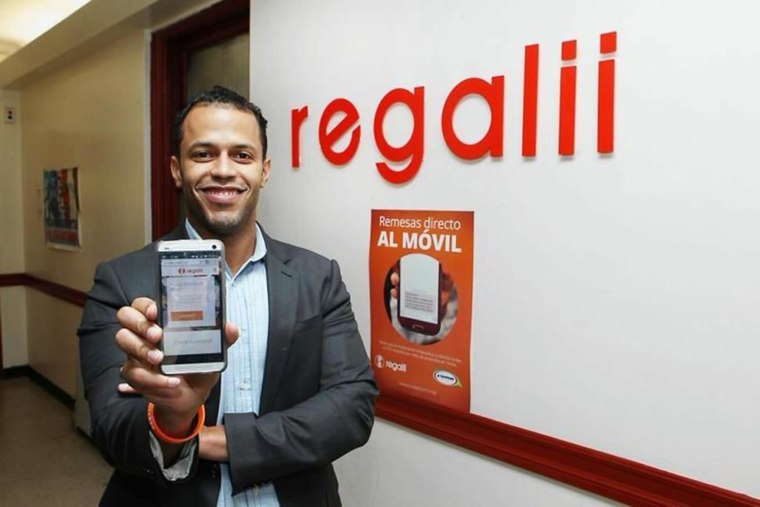Sometimes you become an entrepreneur just by fixing your own problems.
Just ask Edrizio De La Cruz, a 33-year-old Dominican immigrant who is taking on industry giants by changing the way people send money, known as remittances or in Spanish remesas, to help family members in their home countries.
Change was more than overdue, said De La Cruz, who arrived in the United States with his brother and mother when he was 11. Soon, in the long tradition of Latino immigrants in this country, the family began wiring money every month to an aunt and a grandmother in the Dominican Republic. But the process was cumbersome and expensive and required his aunt to get on a bus, stand in long lines, fill out forms and repeat the process. On the front end, De La Cruz had to get cash, wait in line, use a calling card and pay high wire transfer fees.
“It was a pain,” De la Cruz told NBC News.
As he was graduating from the Wharton School of Business about 20 years later, still sending money, De La Cruz realized nothing had changed. “It didn’t make sense to me,” he recalled. “That’s what inspired me.”
In 2013, operating from a small office in Manhattan, De La Cruz and co-founders launched their tech startup Regalii, (a play on the Spanish word regalo, which means gift) which allows immigrants to directly pay bills for their relatives abroad from their computer or mobile phone for a flat $3 transaction fee, compared with the average 9 percent fee charged by the companies which wire cash. Users can also pay with cash at partnering storefronts in 37 U.S. states.
With Regalii, users can help their relatives abroad by directly paying their utilities, mortgages, store credit cards and college tuition.
De La Cruz says the company is growing fast, with more than 60,000 customers. Investors came on board and recently, Regalii expanded beyond the Dominican Republic, launching services to Mexico, El Salvador, Guatemala and Honduras. This week the company is announcing its expansion to Asia, which includes 100 vendor partners, mostly in India. Traditional remittances to India and the Philippines are roughly $97 billion; Regalii's eye on the prize is the roughly $6 billion used for utility payments.
For immigrants, sending money to family back home is part and parcel of the promise of the American dream, De La Cruz said. Regalii allows users to directly pay and track household bills for family members in their home countries.
De La Cruz says that transparency – knowing the money will be used as it was intended – is triggering growth for the company. “These are people who left their family behind and they send sometimes $200 or $300 a month. (With traditional wire transfers) they have no idea how the money is spent,” he added.
According to Pew Research Center, the United States is the most important source of money sent home by migrants to 17 Latin American nations as a group, including Mexico. US. remittances accounted for three-quarters of the total in 2012 -- $41 billion, according to the World Bank.
For immigrants, sending money to family back home is part and parcel of the promise of the American dream, De La Cruz said. That is particularly true in the Dominican Republic, where unless one is part of the upper economic class, getting a visa is as much about luck as anything else, he said.
“So, when you do win the golden ticket, so to speak, you feel fortunate and you feel a responsibility to perform and to give back,” De La Cruz said. “I feel many immigrants are heroes, because they are caring for more than themselves, but for an entire lifeline of families left behind in Latin America.”
In his 20s De La Cruz worked as an airline mechanic to put himself through college. Later he became an investment banker, literally ditching his mechanic overalls one day for a suit on Wall Street the next.
As a teenager, he had watched Bloomberg News with fascination, not fully comprehending, but excited just the same. “You have this optimism on Wall Street about creating and building grand things that a lot of people will use. I knew I wanted to be a part of that,” he said.
“We’re living in a fantastic time right now to start a business,” De La Cruz continued, adding that he was fortunate to surround himself with the right business partners.
“I always see entrepreneurs focusing on the idea. I would say, put much more emphasis on choosing the right people. The ideas and the business will flow. People come first. Ideas second.”
